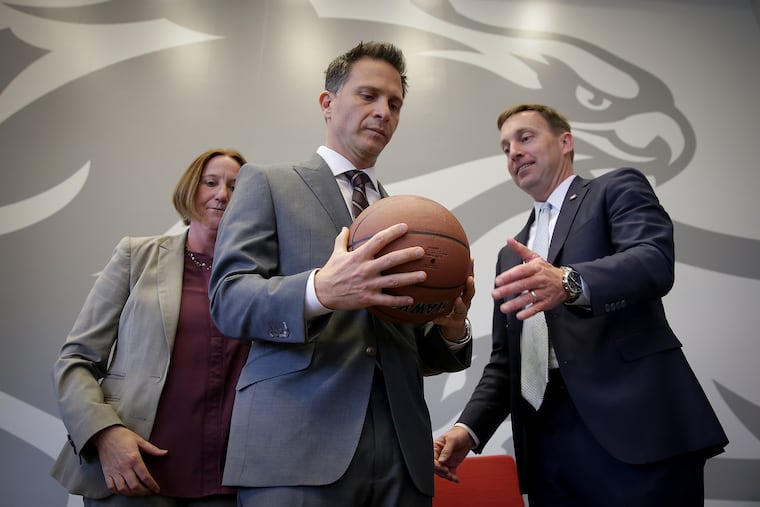As St. Joseph’s new coach, Billy Lange faces a big challenge in the modern Big Five | Mike Sielski
After Lange’s six years with the Sixers, his mission is clear: marry the traditional and innovative at SJU.

They had filled the Hall of Fame Room inside Hagan Arena on Thursday morning for Billy Lange’s introduction as the St. Joseph’s men’s basketball coach -- alumni and boosters and administrators and students and more.
Lange’s family sat on couches in the front. One of Lange’s mentors, former La Salle coach John Giannini, stood nearby. Another -- Brett Brown, fresh from the 76ers’ loss in Atlanta less than 12 hours earlier -- stayed 15 minutes or so before leaving to prepare for his team’s game that night against the Bucks. Lange thanked all of them in his opening remarks to rounds of applause, but when he mentioned a third friend and mentor, Villanova’s Jay Wright, a couple of people booed. They were good-natured boos, all in fun. They drew chuckles. It wasn’t as if something serious had happened, like Bryce Harper striking out.
“There will be time for that,” Lange said.
It was a witty one-liner from Lange, an off-the-cuff acknowledgement that the fiercest rivalry in the Big 5 still carries plenty of cachet -- and that the Big 5 itself still does, too, at least for Lange. He grew up in South Jersey, coached at La Salle under Speedy Morris and Villanova under Wright. His parents are St. Joe’s alumni. As a kid, he estimated, he ate a hundred soft pretzels at who-knows-how-many afternoons and nights at the Palestra. He gets it. He lived it. And Lord, can he talk it.
“I’ve seen first-hand players who have no idea of the Big 5 because they did not grow up in this amazing basketball city,” Lange said. “They come from other areas, and they don’t get it right away -- until they walk to the locker room, and the student body is cursing them out and knows every single thing about their personal life, and they get in that game, and it just changes. Now, all of a sudden, St. Joseph’s against whoever becomes a really big game on the schedule. It’s awesome. You can’t duplicate it, replicate it, anywhere else. Just get in it.”
There were echoes of Wright’s own enthusiasm for the Big 5 in Lange’s words, and that enthusiasm and those words matter. They get to the heart of the balance that Lange has to strike in his new job as he takes over the program.
St. Joe’s has undergone more than a bit of upheaval over the last two years. Don DiJulia retired after 30 years as the university’s athletic director, and roughly nine months into her tenure, Jill Bodensteiner, DiJulia’s successor, fired Phil Martelli. DiJulia and Martelli had a combined 64 years of institutional history and familiarity with St. Joe’s, with the way the university, its athletic department, and the Big 5 had long operated, and that curt three-paragraph press release announcing “a leadership change” in the men’s basketball program indicated two things. Bodensteiner and the new power people at St. Joe’s had no clue that they couldn’t be so cold and corporate about ending a popular and accomplished coach’s tenure, and after one winning season in the last five years, Martelli’s popularity and honorableness no longer engendered the same loyalty they once did.
One attendee kidded that there were more people at Lange’s press conference than there had been at most of the Hawks’ home games this season -- which was a big reason there was a press conference in the first place.
Martelli wasn’t old-fashioned, wasn’t a Luddite by basketball standards. But it was clear on Thursday that Bodensteiner prized Lange’s six years with the Sixers, his experience in their analytics and culture-building from the beginning of “The Process” until now. Every local college coach has been dealing for years with Philadelphia’s shifting demographics, with the enrollment decline in the city’s Catholic and public high schools. There are and have been different pipelines to talent. Fewer fans grow up immersed in the rivalries among St. Joe’s, ‘Nova, Temple, Penn, and La Salle, and those who do don’t take trolleys to the Palestra anymore. They take Uber. Bodensteiner framed Lange’s hire as a move to get ahead of those changes and others to come.
“How do we respect and manage and appreciate and live out that tradition, still here in 2019, while becoming innovative?” Bodensteiner said. “We’ve got to appreciate and celebrate that tradition, but we can’t just stay the same. It’s not the Big 5 of 1958.”
No, it’s not, and that’s the mission for Lange: blazing a new path for the Hawks while holding on to some or all of what has made the program and its place in Philadelphia basketball special.
Just by speaking so frequently and eloquently about the Big 5’s history, just by familiarizing his players with that unique sense of competitiveness and togetherness, Wright has done as much as anyone to maintain the measure of mystique that the Big 5 retains. The Wildcats have been so dominant in the city series for so long that it would have been easy for Wright to adopt the same attitude that led to Villanova’s desire to break up the Big 5 in the early 1990s: We’re bigger than this. We’re better than this. We’re beyond this. To his credit, he hasn’t. His friend’s challenge is different, and despite what he said Thursday morning, Billy Lange has only so much time to meet it.